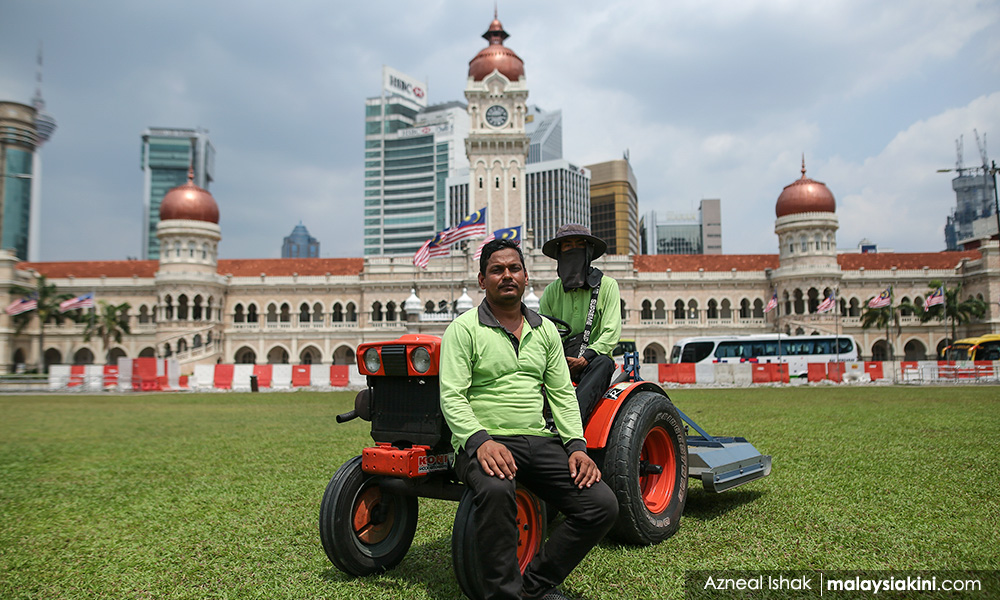
QUESTION TIME | One of the most galling and grating things that Prime Minister Dr Mahathir Mohamad continues to repeat until today is that there are jobs here but Malaysians are not willing to work in the so-called dirty, difficult and dangerous (3D) areas, which is why we have to employ foreigners.
And this is repeated ad nauseam by his underlings, some of them new ministers. This includes Human Resources Minister M Kulasegaran, who appears to have forgotten, along with Mahathir, why he was put there - to help satisfy the aspirations of all Malaysians for a better life. Mahathir is old, and difficult to change. But what is Kulasegaran’s excuse?
We could be having as many as 5.5 million foreign workers (over a third of the total Malaysian workforce), according to this report, of which only two million are legal. And yet, we still want to hire more workers instead of rationalising the foreign worker situation and legalising or deporting as much as 3.7 million workers. That should be the immediate policy imperative.
The same, staid, sad answer for the multitude of problems caused by foreign labour, with no solution in sight, has been given - Malaysians don’t want to work. Using this excuse, massive imports of foreign labour have been allowed, directly impoverishing millions - as much 75 percent of Malaysians in the workforce. That this is the fault of Malaysians who don’t take up these jobs is such a silly fallacy, as we shall show.
I have one question to ask Mahathir and Kulasegaran: Will their children or grandchildren want to work in these 3D jobs? Certainly not. Neither would I want my children to work in these areas. This is not something that Malaysians aspire to, because the wages are not enough to support even just the worker, let alone a family.
What these two, in particular, should be thinking about is how to make 3D jobs less dirty, less difficult and less dangerous. And I would add a fourth dimension to it, less demeaning - the lack of respect and reward our culture gives to these jobs.
Why isn’t the law of supply and demand not allowed to exercise itself when it comes to labour? If labour is scarce, let the price of labour increase, which will be a great way to help equalise the income gap, instead of importing even poorer and desperate people from overseas and exploiting them to the hilt to keep labour costs down, all to the advantage of those employers whose incomes are already high.

The only way to make 3D jobs more acceptable is to pay more for them, and this will make them less demeaning as well. That would also lead a push towards automation and saving labour, which will mean the added value will increase per person and workers can be paid more because of productivity increases.
Such a policy, which encourages greater automation and fewer workers, should be a cornerstone economic imperative for the government if we are to increase incomes for the poor.
Instead, the government is ridiculously encouraging imports of cheap foreign labour, which will just depress the wages of our poorest people. What a travesty!
Filling vacancies
If managers and knowledge workers are in short supply, we should not just import them from overseas at cheaper rates from countries such as China and India, for instance. Instead, we should find Malaysians to fill the vacancies as far as possible, and do the same for labour.
Are we to conclude that our leaders, including the two mentioned, are so stupid as not to realise such basic truths which will help all Malaysian poor? Or is there some other hidden agenda?
We all know from the Royal Commission of Inquiry on Sabah immigration that the previous Mahathir regime was complicit in increasing the numbers of Sabah Muslim bumiputeras by large numbers. And we know that until today, most of the migrant labour comes from Indonesia and Bangladesh. Many of them become citizens and Malays, eventually.
Thus, immigration has been used as a tool to perpetuate Malay dominance, or ketuanan Melayu, by increasing their numbers, but ironically at the expense of Malays themselves, a lot of whom work in the semi-skilled and low-skilled areas. Which is probably why, along with our racism towards blacks, Kulasegaran’s tentative proposals to import African workers has met with resistance, even from Mahathir.
As with many other ironies, much of the problem of foreign workers started from the previous Mahathir era from 1981 to 2003. The first major wave of foreign workers, much of it illegal, began in the Eighties when massive amounts of Indonesian labour were moved into Malaysian estates.
The well-known result of this was that Malaysian Indians were pushed out of their green ghettoes in the plantations and into urban ghettoes, where they worked as manual labourers. Many turned to gangsterism and crime to earn a living.
Eventually, the rot spread and foreign labour began to replace much of labour in Malaysia, including in the construction sector, the domestic sector, and even the electronics sector, all because employers were not willing to pay decent wages to Malaysians.
The job displacement extended beyond the Indians to the others, but nobody cared because the employers are a very strong lobby and pushed hard for cheap labour to fuel their factories and plantations, delaying the automation process that would have contributed to productivity increases.
The employers, most of whom were rather unscrupulous, housed, if they did at all, these workers in cramped quarters or put them into so-called “kongsi” which were basically squatter huts of all shapes and denominations from which they can call upon labour as required.

Here are some statistics for the Malaysian labour force to back up our arguments. In 2017, we had 15 million workers out of a population of 32 million. Of this 15 million, only slightly above a quarter were in the highly-skilled level, while nearly three-fifths were in the semi-skilled sector, and an eighth was at the low-skilled level. This classification considers skilled workers to not only include managerial and professional workers but those at technician levels, which means the semi-skilled and low-skilled levels might well be skewed towards lower skills.
In other words, three-quarters of workers were in the semi-skilled and unskilled sector, and this is the sector which would have been most affected by depressed wages caused by the import of unskilled and semi-skilled workers from overseas. To put it more simply, the import of labour directly impoverishes most Malaysians.
One would think that the younger ministers, who have now taken over important ministries, would have the intelligence, youth, idealism and vigour to dig up and identify the key issues, instead of trying to find cheaper labour from elsewhere because of the “high cost” of regional labour.
They should be challenging Mahathir’s overworn and outdated ideas, and presenting him with facts and figures which will make him want to change for the better. Too many of our ministers are just simply saying, “Yes, Mr Prime Minister,” instead of challenging Mahathir and that has become a problem in government.
It is the job of the next generation to challenge the older generation, especially when the latter has clearly outlived its usefulness and is stuck in the doldrums and inertia of the past and shows no new approaches towards dealing with evermore pressing and changing problems.
There are far more important issues to take care of - the high proportion of foreign labour, the high proportion of foreign illegal labour, a corrupt and extremely inefficient system of procuring overseas labour, the lack of training at school to prepare for more knowledge workers and 101 other things.
Instead, all Mahathir and Kulasegaran can think about is finding cheaper labour from overseas because Malaysians don’t want 3D jobs and employers can’t find labour because they don’t want to pay more.
There is a massive structural problem here that is simply not being recognised, let alone being addressed. What a crying shame! And what a failure of the Harapan government in one key area of economic policymaking.
P GUNASEGARAM is astonished at the lack of planning, thought and creative solutions by the Harapan government in all key problem areas facing the country. The dearth of leadership is sorely glaring. Email: t.p.guna@gmail.com. - Mkini


No comments:
Post a Comment
Note: Only a member of this blog may post a comment.